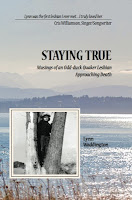The subject line of a recent e-mail from my friend, Jon
Watts, caught my attention: Can I
Continue to Be A Musician?
This Quaker singer and songwriter explained he’s at a
crossroads after four years of ministry through music and the success of his
latest album, “Clothe Yourself in Righteousness.” Even more than any of his previous works, Jon’s latest
explores faithful
Quaker practice and serious transformation. He’s had great turnouts at concerts and good sales of his
music. Equally gratifying for him is
hearing that the music and words are affecting the way that Friends think about
their faith, culture, and identity.
But, while spiritually nourishing, Jon’s music making is not
financially sustainable. He’s given up his apartment, his car, his health
insurance. He figures he has enough money to get through the autumn, but he
needs to make some choices about the future.
“As a Quaker,” Jon wrote, “I’m trying to make this decision
in a discerning way, to find the way forward that I can’t imagine, the way
forward that I can’t arrive at just through reasoning.”
Quakers’ term for this way of deciding is spiritual
discernment, a practice grounded in the central Quaker belief that the
experience and guidance of God is available to every person, that each of us
has an “Inner Teacher” who can lead us to the answers we seek. As Patricia
Loring wrote in the Pendle Hill Pamphlet, Spiritual
Discernment, it’s how we “…discriminate the course to which we are
personally led by God from our other impulses.”
Jon and I learned a lot about spiritual discernment in
Marcelle Martin’s 2007 Pendle Hill course, “Discerning Your Call.” In addition
to reading Loring’s pamphlet and Callings
by Gregg Levoy, we practiced
discernment with clearness committees.
Clearness Committees are a long held Quaker practice in
which a group of Friends meets with a person confronting a dilemma in life. In
the Pendle Hill class, many of us were seeking clarity about work. Other times
the process is used for those facing marriage/divorce adjustments or decisions,
family/parenting difficulties or other major life changes. I’ve requested Clearness
Committees over the years when my family contemplated moves and when I
considered applying for graduate studies in writing. I’ve also served on committees with Friends seeking clarity
about work and calling.
Here’s how they operate in many Quaker meetings.
The person with a concern (focus person) will request
formation of a Clearness Committee, usually under the direction of a committee
in the Meeting. The focus person
gives the committee a written description of the issue needing discernment, and
together they identify a small group of people who might best work with the
focus person to access that Inner Teacher. They all meet, usually several times, to discern
together. Unlike many
decision-making processes, though, the central role of the Clearness Committee
is to ask questions of the focus person. Their job is not to give answers.
Suzanne Farnham’s book, Listening
Hearts: Discerning Call in
Community, gives helpful direction about such evoking questions, questions that only the focus person can know the answers to. Some examples
include:
What hints, messages,
or signs have you received about this?
Where do you sense the
most Life, or Spirit?
When you imagine God
looking at you and your choices, how do you imagine God seeing or responding to
them?
The “listening hearts” role of the committee is most
powerful when committee members set aside personal opinions and listen deeply
to the focus person’s responses.
I can just picture Friends dismissing Jon’s approach to this
valued Quaker process. Until a couple of years ago, I would have, too. But, as
I wrote in one of my first blog posts (
I'm
Not a Birthright Blogger), I’ve been convinced that this electronic media
age offers some tools to nurture and connect us in our spiritual journeys.
Before you write off Jon’s invitation, take a look at his
State of the Art
Report. It’s a fine example of that important first step in the discernment
process.
I’m going to accept
Jon’s invitation. I look forward to trying it and hearing how it works for him.
I expect I’ll learn some new ways to listen.
 Lately, I’ve been reading a craft book by Elizabeth J. Andrew - Writing the Sacred Journey - The Art and Practice of Spiritual Memoir. My copy looks a little ragged. I’ve turned down corners of about half of the pages with exercises I’ll use in my writing practice. I’ve underlined sections that speak to me, such as Andrew’s belief that “spiritual memoir is a form unto itself…a genre in which one’s life is written with particular attention paid to its mysteries.” She also describes well my experience that “…the writing itself becomes a means for spiritual growth.”
Lately, I’ve been reading a craft book by Elizabeth J. Andrew - Writing the Sacred Journey - The Art and Practice of Spiritual Memoir. My copy looks a little ragged. I’ve turned down corners of about half of the pages with exercises I’ll use in my writing practice. I’ve underlined sections that speak to me, such as Andrew’s belief that “spiritual memoir is a form unto itself…a genre in which one’s life is written with particular attention paid to its mysteries.” She also describes well my experience that “…the writing itself becomes a means for spiritual growth.”









